
Volume 31, No. 3 – March 2018
Website:
www.CivilWarRoundTablePalmBeach.org
President’s Message:
The Round Table will have as our speaker Jack Davis,
noted historian and
award-winning author. All
members are invited to bring any guests to the March meeting.
Mr. Davis is an outstanding speaker who will appeal to anyone who
has an interest in history. Bring your family, friends, and neighbors.
We look forward to a wonderful evening.
We’ll see you at the Scottish Rite Hall in Lake Worth on
Wednesday, March 14th at 7:00PM.
Gerridine LaRovere
March 14, 2018 Program:
We are fortunate to
have as our March speaker, Jack Davis.
Mr. Davis was a professor of history at Virginia Tech and
director of programs for Civil War Studies.
He has been twice nominated for the Pulitzer Prize for
“Breckenridge: Statesman, Soldier, Symbol” and “Battle at Bull Run.”
As an expert on Confederate and Southern History, he consults for
numerous television productions and the History Channel.
We are so pleased to have Mr. Davis give a presentation to the
Round Table. Thank you to
Robert Franke for arranging this speaking engagement.
The topic will be:
The
General in Love, The story of General Gabriel C. Wharton's CSA courtship
and marriage.
February 14, 2018 Program:
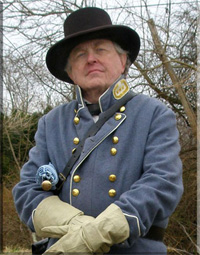 Our
February speaker was Dave Meisky.
He is a living historian from Virginia who has studier the life
and times of William "Extra Billy" Smith. Our
February speaker was Dave Meisky.
He is a living historian from Virginia who has studier the life
and times of William "Extra Billy" Smith.
One of the
interest characters of the civil war era is William Smith of Virginia,
usually referred to as "Extra Billy".
Born in 1797 he was a lawyer and business man, operating a
stagecoach line, before entering politics.
Before the war he served twice in the Virginia State Senate, five
terms in the US House of Representatives, as Governor from 1846 through
1848 after which he went to California where he remained for three and a
half years during the gold rush.
With the outbreak of the war he was commissioned Colonel,
commanding the 48th Virginia Infantry Regiment during the campaigns of
1861 and 62. He was
seriously wounded three times in the battle of Sharpsburg and was
recuperating for six months before returning to active duty in the
spring of 1863 with a promotion to Brigade General and command of a
brigade. In May he was
elected governor but since the term didn't begin until January 1, 1864,
he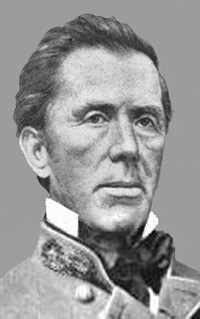 was commanding his brigade during the Gettysburg campaign.
He resigned his military commission on December 31st and was
inaugurated as governor on New Years Day, 1864.
was commanding his brigade during the Gettysburg campaign.
He resigned his military commission on December 31st and was
inaugurated as governor on New Years Day, 1864.
On April 2, 1865, word was received in Richmond that
Confederate lines in front of Petersburg were breaking and General Lee
was withdrawing his army which necessitated the evacuation on Richmond.
While at church at St. Paul’s in Richmond, Extra Billy reported:
“On Sunday the 2nd of April, 1865, during divine service, I saw a
messenger hurriedly advance to Mr. Davis' pew and hand him a paper.”
The treasury was emptied with
twenty-one
thousand dollars in specie load on to transport.
At 11 PM the Confederate government left by train to re-establish
the capitol in Danville, VA.
Two hours later Governor William Smith and the state government left for
Lynchburg via the James River Canal.
The party consisted of Smith, his son and aide Peter Bell Smith,
his servant George Hunter, two canal barges carrying government records,
members of the legislature and various government departments, a
detachment of cadets from the Virginia Military Institute, and a number
of others. Thus, on April 3rd began an
odyssey that was to last until Smith’s surrender on
June 9, 1865.
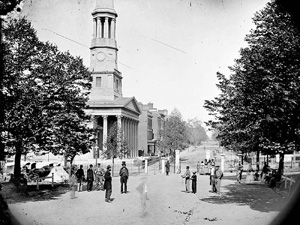 While
Jefferson Davis was saying on April 4th: “Relieved from
the necessity of guarding
particular points .. with an army free to move .. and strike in detail
.. nothing is now needed to render our triumph certain but the
exhibition of our own unquenchable resolve. ,” Extra Billy was
proceeding via canal and road from Richmond to Columbia.
After crossing the James River the party was at Buckingham Court
House on April 5th where the state
archives were deposited in the local jail and a number of individuals
dispersed on their separate routes. While
Jefferson Davis was saying on April 4th: “Relieved from
the necessity of guarding
particular points .. with an army free to move .. and strike in detail
.. nothing is now needed to render our triumph certain but the
exhibition of our own unquenchable resolve. ,” Extra Billy was
proceeding via canal and road from Richmond to Columbia.
After crossing the James River the party was at Buckingham Court
House on April 5th where the state
archives were deposited in the local jail and a number of individuals
dispersed on their separate routes.
Governor Smith
and a small party passed through Appomattox Court House on April 6th, several days
before the armies arrived in the vicinity, and on the 7th they were in
Lynchburg. At the same time
Lincoln was meeting with John Campbell and offering very generous terms:
“.. gentlemen who have acted as the legislature of Virginia in support
of the rebellion may now desire to assemble at Richmond ..
give them permission and protection..”
Next he turned south and arriving in Danville on the 10th, as the
Confederate government was preparing to leave for the Carolinas.
It was there that he learned of Lee’s surrender.
Declining President Davis' invitation to join the Confederate
government Smith decided to remain in Danville and carry on the state
government
For two weeks he
remained in Danville exercising what civil and military authority he
still retained.
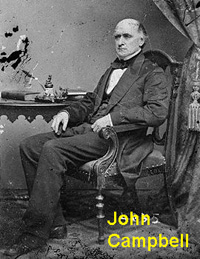 He wrote to General Grant inquiring as to the Federal
government's attitude to his state government.
“Will the State government .. be superseded by a military or
civil organization? Will the State officials of the Virginia government
be subject to military arrest?”
He received a very non-committal reply.
About all he got was this reply from Meade:
“Lieutenant-General Grant has, at present, no reply to make to
your letter, and should he hereafter have one, it will be presented to
you by special messenger.”
Billy made provisions for providing supplies to paroled Confederate
soldiers making their way home from Appomattox and issued a proclamation
authorizing county sheriffs and judges to organize citizen patrols to
help maintain order on areas where Confederate control had vanished and
Federal forces had not yet arrived.
He wrote to General Grant inquiring as to the Federal
government's attitude to his state government.
“Will the State government .. be superseded by a military or
civil organization? Will the State officials of the Virginia government
be subject to military arrest?”
He received a very non-committal reply.
About all he got was this reply from Meade:
“Lieutenant-General Grant has, at present, no reply to make to
your letter, and should he hereafter have one, it will be presented to
you by special messenger.”
Billy made provisions for providing supplies to paroled Confederate
soldiers making their way home from Appomattox and issued a proclamation
authorizing county sheriffs and judges to organize citizen patrols to
help maintain order on areas where Confederate control had vanished and
Federal forces had not yet arrived.
 As the 6th Corps
of the Army of the Potomac approached Danville, Billy moved north to
Lynchburg. From there he
sent a letter to President Andrew Johnson on May 3rd but the letter
was intercepted by General Henry Halleck in Richmond and his messenger
was arrested. During this
period the U.S. authorities had been making efforts to capture Billy and
they upper the stakes on May 8 with a $25,000. reward on his head.
The following day President Johnson issued a proclamation
declaring that anyone who assisted Smith was "in rebellion against the
United States and would be dealt with accordingly."
He also declared the Francis Pierpont would exercise authority as
governor. As the 6th Corps
of the Army of the Potomac approached Danville, Billy moved north to
Lynchburg. From there he
sent a letter to President Andrew Johnson on May 3rd but the letter
was intercepted by General Henry Halleck in Richmond and his messenger
was arrested. During this
period the U.S. authorities had been making efforts to capture Billy and
they upper the stakes on May 8 with a $25,000. reward on his head.
The following day President Johnson issued a proclamation
declaring that anyone who assisted Smith was "in rebellion against the
United States and would be dealt with accordingly."
He also declared the Francis Pierpont would exercise authority as
governor.
Leaving
Lynchburg the Governor crossed the mountains into the Shenandoah Valley
where he visited Lexington and Staunton before re-crossing the Blue
Ridge Mountains to the area of Lynchburg.
During this period Billy wrote letters to John Tucker, former
Virginia Attorney General,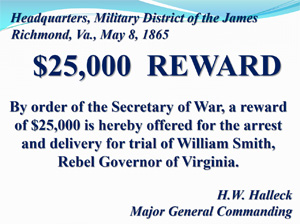 General Henry Halleck, commander of all Federal forces in Virginia , and
Robert E, Lee. In all these
he expressed his conviction that there was no sentiment in Virginia
toward continuing the fight.
Smith did face a dilemma as to what his actions should be.
Many former Confederate leaders at both the national and state
levels had surrendered or been captured and most high tanking officials
were being imprisoned.
General Henry Halleck, commander of all Federal forces in Virginia , and
Robert E, Lee. In all these
he expressed his conviction that there was no sentiment in Virginia
toward continuing the fight.
Smith did face a dilemma as to what his actions should be.
Many former Confederate leaders at both the national and state
levels had surrendered or been captured and most high tanking officials
were being imprisoned.
Traveling east
Billy established himself about 20 miles from Richmond where his son,
Bell Smith, carried out negotiations with the Federal authorities for
Smith's surrender:
· “Ex-Governor William
Smith will deliver himself this afternoon. Where shall I send him?”
Halleck to Stanton - June 8th
· “If Mr. Smith
surrenders himself you may take such measures... you deem proper...
either in respect to his close imprisonment, giving bail or parole..."
Staunton to Halleck - June 8th
As a result
on June 8th the former
governor surrendered himself in Richmond and five days later signed a
parole and returned home to Warrenton, VA.
In June a Federal grand jury in Norfolk, Va. handed down an
indictment for treason against Smith and about 50 other former
Confederate leaders, both civilian and military.
After General Lee, who was listed in the indictment, wrote to
General U. S. Grant who, in turn, sent a strong protest to President
Andrew Johnson and threatened to resign if the indictment was allowed to
go forward.
Smith would live
for a number of years before dying in 1887.
He is buried in Hollywood Cemetery in Richmond.

Last changed: 03/04/18
Home
About News
Newsletters
Calendar
Memories
Links Join
|

